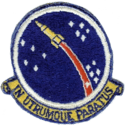556th Strategic Missile Squadron
| 556th Strategic Missile Squadron | |
|---|---|
|
556th SMS Convair SM-65F Atlas #100 at Site 6 Au Sable Forks NY | |
| Active | 1942-1965 |
| Country | United States |
| Branch | United States Air Force |
| Type | Strategic Missile Launch Squadron |
| Garrison/HQ | Plattsburgh AFB, New York |
| Engagements |
World War II (EAME Theater) |
| Decorations |
Distinguished Unit Citation |
| Insignia | |
| 556th Strategic Missile Squadron emblem |
 |
The 556th Strategic Missile Squadron (551 SMS) is an inactive United States Air Force unit. It was last assigned to the 820th Strategic Aerospace Division, stationed at Plattsburgh AFB, New York.
The 556 SMS was equipped with the SM-65F Atlas Intercontinental ballistic missile (ICBM), with a mission of nuclear deterrence. It was the only ICBM squadron east of the Mississippi River. The squadron was inactivated as part of the phaseout of the Atlas ICBM on 25 June 1965.
History
World War II
Activated as a B-26 Marauder medium bombardment squadron in late 1942, it trained under the Third Air Force and deployed to the European Theater of Operations (ETO) in July 1943. It was initially stationed in England and assigned to IX Bomber Command.
The squadron engaged in the tactical bombardment of enemy targets in Occupied Europe, initially from stations in England. After D-Day, it moved to Advanced Landing Grounds in France and Belgium, moving eastward as Allied ground forces advanced. It supported Eighth Air Force strategic bombardment missions over Nazi Germany and Occupied Europe; striking enemy airfields to obtain maximum interference in Luftwaffe day interceptor attacks on heavy bomber formations returning to England. It also participated in the Western Allied Invasion of Germany, March–April 1945, combat ending with the German capitation in May.
The squadron became part of the United States Air Forces in Europe while demobilizing personnel in 1945. It was reassigned to the United States as a paper unit, where it was inactivated in November 1945.
Intercontinental Ballistic Missile Squadron

Reactivated in 1957 as a Strategic Air Command (SAC) Strategic Missile Squadron, it initially performed testing on the SM-62 Snark intercontinental cruise missile. It also carried out testing at the Atlantic Missile Range in Florida; moving to Presque Isle AFB, Maine for operational deployment in 1959. It was reactivated after the missile was brought into service.
Reactivated in 1961 as a SAC SM-65F Atlas ICBM launch squadron, the unit was stationed at Plattsburgh AFB, New York and assigned to the 820th Air (later Strategic Aerospace) Division on 1 July 1961. The activation of the 556th SMA at Platsburgh AFB was the only Atlas ICBM squadron east of the Mississippi River.
The squadron was assigned twelve missiles, based in a 1 x 12 configuration: twelve independent widely dispersed launch sites comprised the missile squadron. The first missile arrived in April 1962, the silos were declared operational in December. During the Cuban missile crisis, the 556th received orders to maintain all 12 missiles on alert status.
The Atlas F was the final and most advanced version of the Atlas ICBM and was stored in a vertical position inside underground concrete and steel silos. When stored, the Atlas F sat atop an elevator. If a missile was placed on alert, it was fueled with RP-1 (kerosene) liquid fuel, which could be stored inside the missile for extended periods. If a decision was made to launch the missile, ít was raised to the surface and the liquid oxygen tank was filled. The launch would occur shortly after completion of this process. (see below for site details).
The exposure on the surface that this procedure entailed was the great weakness of the Atlas F. It was exposed and vulnerable during this time. Titan II and Minuteman missiles could be launched from within their silos, thereby eliminating this vulnerability. Also, since the Titan did not use a cryogenic fuel or oxydizer, and the Minuteman was a solid fuel rocket, they could be stored fully fueled and ready to launch within a few minutes.
The first Atlas F missile was removed from alert status in favor of the more advanced LGM-25C Titan II on December 1, 1964; the squadron was inactivated on 25 June 1965. Missile sites were subsequently sold off to private ownership after demilitarization.
Lineage

- Constituted as the 556 Bombardment Squadron, (Medium) on 25 Nov 1942
- Activated on 1 Dec 1942
- Redesignated 556 Bombardment Squadron, (Medium) on 9 Oct 1944
- Inactivated on 12 Nov 1945
- Redesignated 556th Strategic Missile Squadron on 22 Nov 1957
- Activated on 15 Dec 1957
- Inactivated on 16 Jul 1959
- Activated on 26 Apr 1961
- Organized on 1 Oct 1961
- Inactivated on 25 June 1965
Assignments
- 387th Bombardment Group, 1 Dec 1942-12 Nov 1945
- Strategic Air Command, 15 Dec 1957
- 702d Strategic Missile Wing, 1 Apr-16 Jul 1959
- Strategic Air Command, 26 Apr 1961
- 820th Air Division (later 820th Strategic Aerospace Division), 1 Oct 1961 - 25 June 1965[1]
Stations
|
|
Aircraft and missiles

- B-26 Marauder, 1942-1945
- SM-62 Snark, 1958–1959
- SM-65F Atlas, 1962–1964
- Operated twelve missile sites of one missile at each site (12 total):
- 556-1 5.2 mi W of Rouses Point, NY 45°00′04″N 073°28′18″W / 45.00111°N 73.47167°W
- 556-2 1.0 mi E of Alburg, VT 44°59′14″N 073°17′18″W / 44.98722°N 73.28833°W
- 556-3 1.3 mi SSW of Swanton, VT 44°54′08″N 073°08′17″W / 44.90222°N 73.13806°W
- 556-4 6.4 mi S of Willsboro Point, NY 44°20′33″N 073°22′11″W / 44.34250°N 73.36972°W
- 556-5 8.2 mi NNE of Elizabethtown, NY 44°19′55″N 073°33′13″W / 44.33194°N 73.55361°W
- 556-6 2.1 mi NE of Au Sable Forks, NY 44°27′36″N 073°38′33″W / 44.46000°N 73.64250°W
- 556-7 4.1 mi E of Loon Lake, NY 44°32′30″N 073°58′31″W / 44.54167°N 73.97528°W
- 556-8 6.6 mi WSW of Saranac, NY 44°36′04″N 073°51′24″W / 44.60111°N 73.85667°W
- 556-9 5.9 mi NW of Dannemora, NY 44°46′15″N 073°49′20″W / 44.77083°N 73.82222°W
- 556-10 7.3 mi SE of Chateaugay, NY 44°50′36″N 073°59′17″W / 44.84333°N 73.98806°W
- 556-11 14.0 mi WNW of Ellenburg, NY 44°54′44″N 073°49′04″W / 44.91222°N 73.81778°W
- 556-12 10.7 mi WNW of Mooers, NY 44°58′03″N 073°37′29″W / 44.96750°N 73.62472°W
See also
References
Notes
- ↑ "Factsheet 820 Strategic Aerospace Division". Air Force Historical Research Agency. Oct 11, 2007. Archived from the original on October 30, 2012. Retrieved March 5, 2014.
Bibliography
![]() This article incorporates public domain material from the Air Force Historical Research Agency website http://www.afhra.af.mil/.
This article incorporates public domain material from the Air Force Historical Research Agency website http://www.afhra.af.mil/.
- Maurer, Maurer, ed. (1983) [1961]. Air Force Combat Units of World War II (PDF) (reprint ed.). Washington, DC: Office of Air Force History. ISBN 0-912799-02-1. LCCN 61060979.
- Maurer, Maurer, ed. (1982) [1969]. Combat Squadrons of the Air Force, World War II (PDF) (reprint ed.). Washington, DC: Office of Air Force History. ISBN 0-405-12194-6. LCCN 70605402. OCLC 72556.


